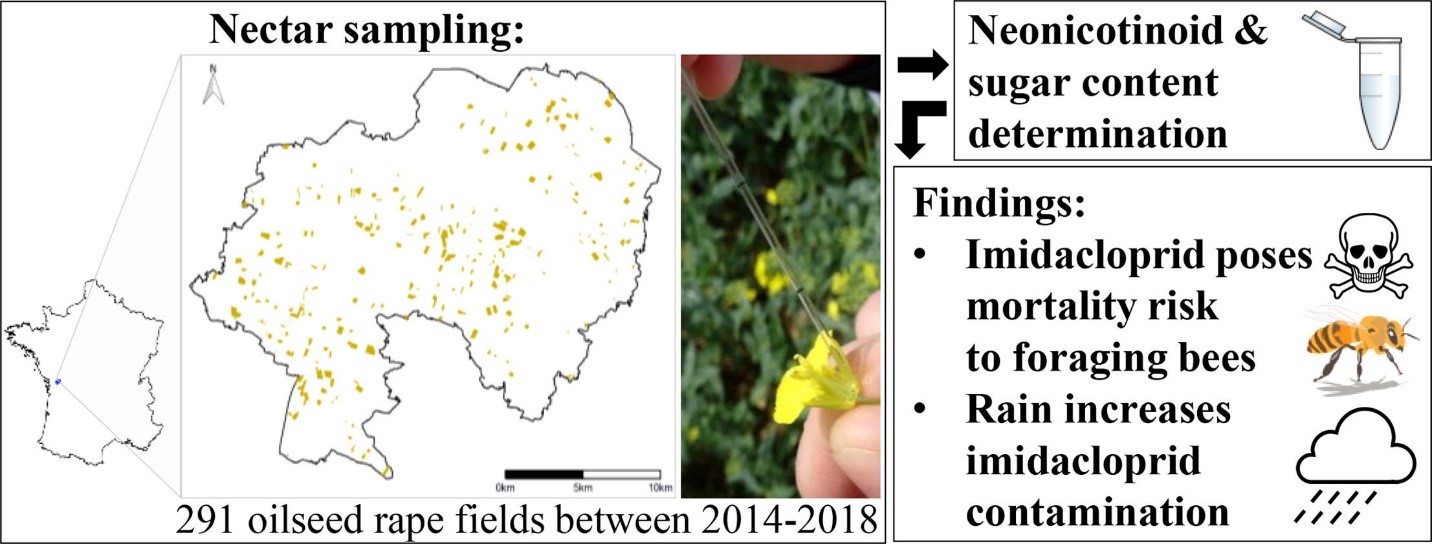Study Finds EU Moratorium of Persistent Bee-Toxic Pesticides Cannot Eliminate Short-Term Hazards
(Beyond Pesticides) Five years after three neonicotinoids were banned for use on bee-attractive crops in the EU, researchers found that these bee-toxic chemicals are contaminating soils and poisoning the nectar of oilseed rape (canola). The results of this research point to an immediate need to end the use of persistent environmental contaminants and promote organic practices.
Researchers set out to determine whether the EU moratorium eliminated the risk for bees that forage on oilseed rape nectar. They tested for imidacloprid, thiamethoxam, and clothianidin residues in the nectar of winter-sown oilseed rape in from 291 oilseed rape fields in western France for five years following the EU moratorium (2014-2018).
Results show all three neonicotinoids were present at least once in the study’s time period. Imidacloprid was detected every year with “no clear declining trend,” though its prevalence fluctuated widely between years. Two samples from 2016 show residues that are five times the expected maximum concentration in nectar of a plant directly treated with imidacloprid. Residue levels in the nectar depend on soil type and increase with rainfall. The researchers put forth in their discussion that the imidacloprid contamination may likely be caused by runoff from neighboring, treated plants. Neonicotinoids are water-soluble (a necessary function in order to be a systemic pesticide) and therefore leach from their intended site throughout the environment.
Another aspect to the study includes an assessment of acute and chronic risk to foraging bees. Using a scheme adapted from the European Food Safety Authority’s first-tier risk assessment, researchers “simulated the risk of imidacloprid-induced mortality for individual honeybees, bumblebees, and solitary bees foraging on oilseed rape nectar over a period of 10 days” and found some disturbing results.
Risk peaks in 2014 and 2016 indicate that 50% of honey bees were likely to die from imidacloprid on 12% of the study plots. Risk for individual wild bees was even higher. The researchers admit that their analysis is a worst-case scenario, and likely bees do not solely forage on one crop. However, oilseed rape is a bee-attractive crop that flowers while bee colonies are growing and have high foraging demands. The study notes that wildflowers have similarly been found to contain neonicotinoid residues, representing a widespread problem where non-target bee fodder is contaminated with bee-toxic pesticides.
These data illustrate that the EU moratorium, while viewed as a critically needed step, cannot in the short-term eliminate risk from persistent pesticides for foraging bees. Researchers conclude, “Despite the limitations of case-studies and risk simulations, our findings provide additional support to the recent extension of the moratorium to a permanent ban in all outdoor crops.” Beyond Pesticides contends that, further than a ban on these individual chemicals which can readily be replaced with other bee-toxic substitutes, organic agriculture must be presented as the alternative option.









